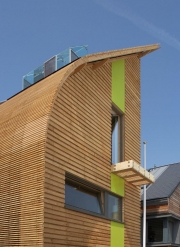Mission
3CSEP is an interdisciplinary research and educational center whose mission is to foster solutions to climate change and sustainable energy challenges, while advancing the implementation of development agendas. The center conducts its research at both the global and the regional/local levels, using selected regions and localities as case studies. 3CSEP also provides a platform for academic, outreach and educational activities in these fields.
One of the center’s major aims is to train Master’s and doctoral students in conducting research in the fields of climate change and sustainable energy. Students from CEU and other universities work at 3CSEP as interns, volunteers, PhD researchers as well as junior research staff. Senior researchers at the center supervise Master’s theses and doctoral dissertations at CEU and other universities.
At 3CSEP we believe that climate change can be controlled at levels that do not constitute a dangerous anthropogenic interference with the climate system, without major sacrifices in human well-being and development. We believe that there is a broad portfolio of technological and non-technological measures and policies that can foster both the stabilization of our climate and economic/social development. A large share of these options relate to sustainable energy production and use.
Activities
The activities at 3CSEP focus around two broad areas, with several initiatives falling into both areas:
- Championing solutions to climate change, including but not limited to, identifying and assessing low- and no-cost remedies that are compatible with sustainable development agendas and crafting policy portfolios promoting such options.
- Promoting sustainable energy solutions and policies that advance development and public policy agendas.
Research and education at 3CSEP focuses on global and regional problems. Effective work related to climate change and sustainable energy must cross traditional disciplines and clusters of thinking. Thus, the Center is committed to an interdisciplinary approach as well as integrating knowledge and methods from the natural, technical, social sciences, and humanities. Projects often target the interface among technology, society, policy and politics. Several projects directly advise national and trans-national governments (EU, UN) and provide guidance for international organizations and networks.
While 3CSEP conducts in-depth research into specific research questions, most activities are guided by the pursuit of finding answers to a general set of fundamental questions related to climate change and sustainable energy, including:
- Are development goals jeopardized if the climate is to be stabilized at levels that do not constitute a dangerous anthropogenic interference with the climate system?
- Can synergies be forged between development targets and climate change action?
- What are the implications of development pathways on climate change?
- Beyond the deployed technologies and those in the pipeline, how much can non-technological solutions, such as those relating to development pathways, lifestyle, culture, behavior, contribute to combating the problem? How much policy leverage do we have over these drivers of consumption and thus emissions?
- Can we deliberately change the course of development pathways?
- How can presently known cutting-edge mitigation and adaptation measures be deployed on a societal basis?
International and national involvement
3CSEP contributes to the governance of international decision-making processes related to climate change and sustainable energy, including:
- Intergovernmental Panel on Climate Change (IPCC)
- Global Energy Assessment (GEA)
- United Nations Scientific Expert Group on Climate Change (UN SEG)
- United Nations expert group on energy-efficiency “Bringing Energy Efficiency to Scale”
- United Nations Sustainable Building and Climate Initiative (UNEP SBCI)
- Research projects under the EU’s Intelligent Energy - Europe and Framework Programs, as well as European Parliament
3CSEP also contributes to Hungarian national strategy- and policy-making bodies, including the Hungarian Government’s Climate Change Strategy (NES) and advisory work for the Hungarian Ministry of Environment and Water, particularly on mitigation of CO2 emissions from buildings in Hungary, and the National Development Agency.

